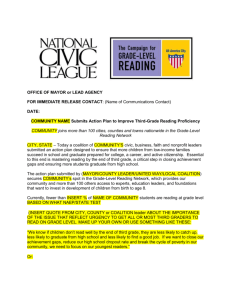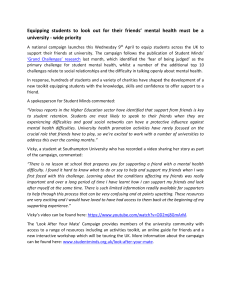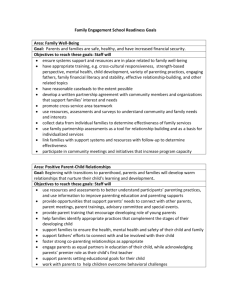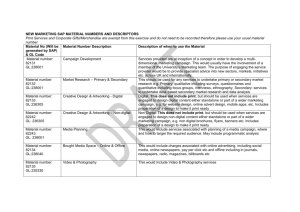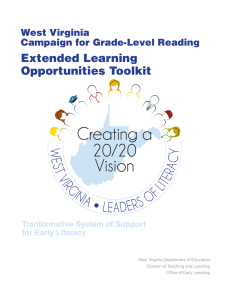Kellogg prntg v4 - The Campaign for Grade
advertisement
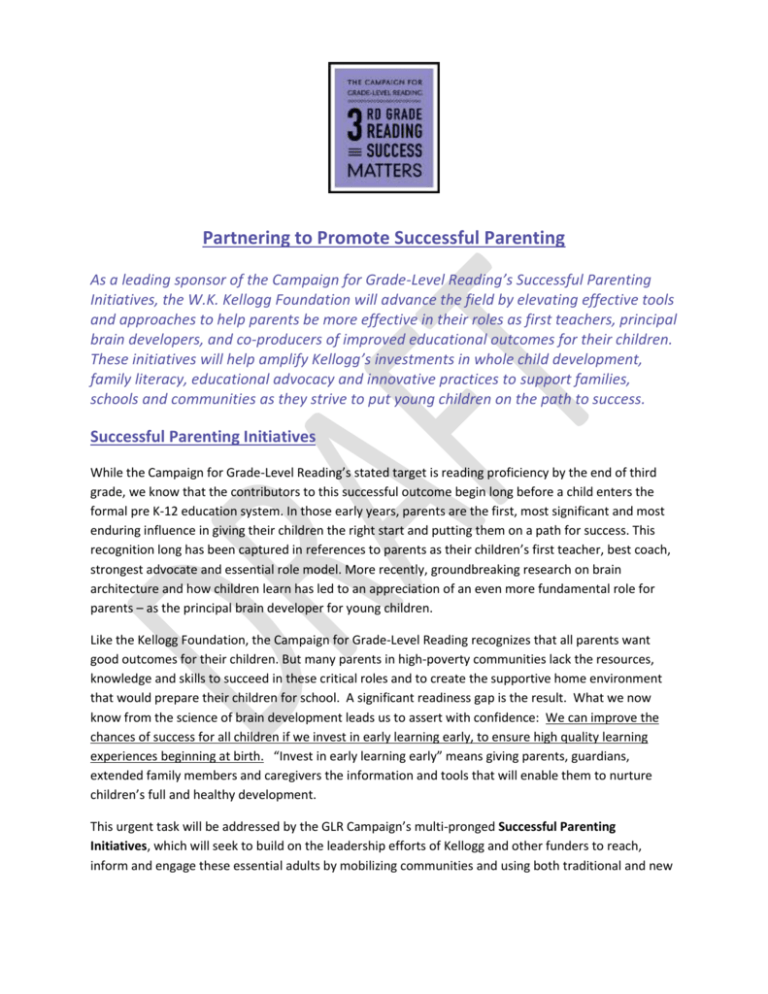
Partnering to Promote Successful Parenting As a leading sponsor of the Campaign for Grade-Level Reading’s Successful Parenting Initiatives, the W.K. Kellogg Foundation will advance the field by elevating effective tools and approaches to help parents be more effective in their roles as first teachers, principal brain developers, and co-producers of improved educational outcomes for their children. These initiatives will help amplify Kellogg’s investments in whole child development, family literacy, educational advocacy and innovative practices to support families, schools and communities as they strive to put young children on the path to success. Successful Parenting Initiatives While the Campaign for Grade-Level Reading’s stated target is reading proficiency by the end of third grade, we know that the contributors to this successful outcome begin long before a child enters the formal pre K-12 education system. In those early years, parents are the first, most significant and most enduring influence in giving their children the right start and putting them on a path for success. This recognition long has been captured in references to parents as their children’s first teacher, best coach, strongest advocate and essential role model. More recently, groundbreaking research on brain architecture and how children learn has led to an appreciation of an even more fundamental role for parents – as the principal brain developer for young children. Like the Kellogg Foundation, the Campaign for Grade-Level Reading recognizes that all parents want good outcomes for their children. But many parents in high-poverty communities lack the resources, knowledge and skills to succeed in these critical roles and to create the supportive home environment that would prepare their children for school. A significant readiness gap is the result. What we now know from the science of brain development leads us to assert with confidence: We can improve the chances of success for all children if we invest in early learning early, to ensure high quality learning experiences beginning at birth. “Invest in early learning early” means giving parents, guardians, extended family members and caregivers the information and tools that will enable them to nurture children’s full and healthy development. This urgent task will be addressed by the GLR Campaign’s multi-pronged Successful Parenting Initiatives, which will seek to build on the leadership efforts of Kellogg and other funders to reach, inform and engage these essential adults by mobilizing communities and using both traditional and new ways to communicate the message, including “high-touch,” “high-tech,” and popular media. As presently envisioned, the Successful Parenting Initiatives will include these components: Supporting Parents for Success: National programs such as Parents as Teachers, HIPPY, the National Center for Family Literacy and Nurse-Family Partnership have a well-established record for providing parents with guidance and tools to nurture their children’s development. In some communities, such as New Orleans and Albuquerque, families are receiving help from local programs. But despite the quality and commitment of these groups, large numbers of lowincome parents still are not reached with the help that will enable them to succeed in their roles and responsibilities. The GLR Campaign will bring together representatives from the leading national parent-support organizations, selected local programs, funders working in this arena such as Kellogg at the national level and Skillman in the key community of Detroit, and public agencies fostering coordinated action to help young children and their families, such as Michigan’s Early Childhood Investment Corporation, to develop a common sense consensus and action recommendations about how best to help more low-income parents succeed in supporting their children’s development. Parents and Teachers Together: Educators have long known that “parent engagement” helps children succeed, although they often struggle with how to make that vital connection. And parents who want to be actively engaged often face challenges in finding welcoming ways to be involved substantively to support and improve what is happening at school. Kellogg’s Educational Advocacy program supports efforts to bridge that divide to assure effective communication and cooperation between and among adults, and a number of programs are demonstrating the benefits of approaches that build parents’ capacity to be involved in their children’s education and that foster perceived and real partnership between parents and the school. For example, Kellogg grantee Abriendo Puertas/Opening Doors is providing Latino parents with the knowledge to promote school readiness and the confidence to be active participants in their children’s education. Teacher home visiting is another approach that makes the connection, helping teachers understand the factors that may be affecting student performance and helping parents understand how they can help their children do better in school. Parents and Teachers Together will find and promote promising programs and strategies such as these through which parents and teachers are building and strengthening the partnerships that will allow them to co-produce better outcomes for young students. Technology for Successful Parenting: Community engagement, home visiting and other “high touch” programs and practices are essential to building a culture of support needed for successful parenting. Yet, the magnitude of the challenge is such that, even combined, these will not reach enough parents to move the needle. Today’s technology has to be seen as part of the solution. Toward that end, Technology for Successful Parenting has embarked on an effort to identify and/or develop ways to use technology to provide low-income parents with the tools and information they need to nurture their children’s development and literacy skills. Thus far, this has included: (1) a partnership with the New America Foundation and Joan Ganz Cooney 2 Center to publish Pioneering Literacy in the Digital Wild West; (2) a partnership with ConvergeUS and PBS that led to recent release of the award-winning PBS’ Parents Play & Learn app; and (3) a collaboration with First Book to develop a vision and plan for a virtual marketplace to facilitate widespread access to and adoption of digital resources, including e-books, interactive games, smart technology and other digital content. These Successful Parenting Initiatives provide a powerful approach for communities to more effectively involve parents in their efforts to improve school readiness, school attendance, and summer learning. With a common focus on engaging parents as co-creators of their children’s learning, this approach aligns well with Kellogg’s commitment to whole child development, family literacy, educational advocacy and innovative educational practices that stem from collaborations among schools, families, and communities. About the Campaign for Grade-Level Reading Launched in 2010, the Campaign for Grade-Level Reading is a decade-long effort by foundations, nonprofit partners, states and communities across the nation to ensure that more children from lowincome families succeed in school and graduate prepared for college, a career and active citizenship. The Campaign focuses on reading proficiency by the end of third grade, a key predictor of high school graduation and a milestone missed by more than 80% of low-income children. These children arrive at school already far behind their more affluent peers, fall farther behind by missing too much instructional time due to chronic absenteeism, and then lose ground over the summer, each summer. The Campaign’s message that this catastrophe-in-the-making must be addressed has tapped into the widespread consensus about the need for more high school graduates, with an encouraging response. Over 40 sector-leading organizations have signed on as Campaign Partners. More than 120 communities have become part of the Campaign’s Grade-Level Reading Communities Network by assembling broadbased coalitions and developing plans to tackle the readiness, attendance and summer learning challenges. These GLR Network communities hail from 35 states, the District of Columbia, Puerto Rico and the U.S. Virgin Islands and include over 1600 organizations in their local coalitions. Our goal: By 2020, a dozen states or more will increase by at least 100% the number of children from low-income families reading proficiently by the end of third grade. The milestones1 by which the GLR Campaign will assess whether it is on track for sustainable momentum toward the 2020 goal are: 1 The GLR Campaign initially defined milestones for the mid-point of the effort, which will be 2015. It subsequently has broken out the 2016 milestone related to student progress, because that will synchronize with the availability of data from the National Assessment of Educational Progress. 3 If by 2015, grade-level reading has become: a priority for parents, educators, sector leaders and policymakers; a performance measure for schools and school districts; a target for increased investment and citizen service; and a catalyst for policy advocacy. If by 2016, at least two dozen communities report measurable progress on critical indicators of school readiness, student attendance, summer learning and grade-level reading at the end of first, second and third grades. An encouraging sign of the growing movement in states, governors, chief state school officers and legislative leaders in as many as 30 states have put a “stake in the ground” for third-grade reading. 4
